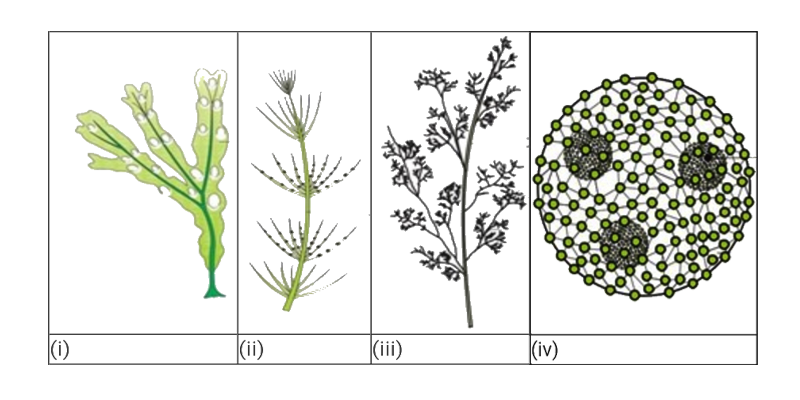Algae such as (i)_______ have a haplo-diplontic life cycle, while Fucus has a (ii)_______ life cycle.
i-Ectocarpur, ii-haplontic
i-Spirogyra, ii-diplontic
i-Ectocarpus, ii-diplontic
i-Spirogyra, ii-haplontic
The correct Answer is:C
To answer the question, we need to fill in the blanks regarding the life cycles of certain algae.
1. Identify algae with a haplo-diplontic life cycle:
- The haplo-diplontic life cycle is characterized by the presence of both haploid (gametophytic) and diploid (sporophytic) stages that are both significant in the life cycle.
- An example of algae that exhibits a haplo-diplontic life cycle is Ectocarpus.
2. Identify the life cycle of Fucus:
- Fucus is a type of brown algae that primarily exists in the diploid state for most of its life cycle, indicating it has a predominantly diploid (sporophytic) life cycle.
- Therefore, Fucus has a diplontic life cycle.
Combining these findings, we can fill in the blanks:
(i) Ectocarpus
(ii) Diplontic
Final Answer:
Algae such as Ectocarpus have a haplo-diplontic life cycle, while Fucus has a diplontic life cycle.
- The haplo-diplontic life cycle is characterized by the presence of both haploid (gametophytic) and diploid (sporophytic) stages that are both significant in the life cycle.
- An example of algae that exhibits a haplo-diplontic life cycle is Ectocarpus.
- Fucus is a type of brown algae that primarily exists in the diploid state for most of its life cycle, indicating it has a predominantly diploid (sporophytic) life cycle.
- Therefore, Fucus has a diplontic life cycle.
(ii) Diplontic
Algae such as Ectocarpus have a haplo-diplontic life cycle, while Fucus has a diplontic life cycle.
Similar Questions
Knowledge Check
- Question 1 - Select One
Haplo-diplontic life cycle is found in
AbryophytesBpteridophytesCfungiDboth a and b - Question 2 - Select One
Which algae has diplontic life cycle
AVolvoxBFucusCEctocarpusDspirogyra - Question 3 - Select One
Haplodiplontic life cycle is observed in
ABryophytaBPteridophytaCMost of the AlgaeDBoth (a) and ( b)


